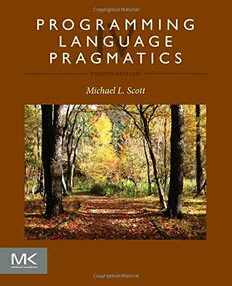Table Of ContentProgramming Language Pragmatics
FOURTH EDITION
This page intentionally left blank
Programming Language Pragmatics
FOURTH EDITION
Michael L. Scott
Department of Computer Science
University of Rochester
AMSTERDAM (cid:129) BOSTON (cid:129) HEIDELBERG (cid:129) LONDON
NEW YORK (cid:129) OXFORD (cid:129) PARIS (cid:129) SAN DIEGO
SAN FRANCISCO (cid:129) SINGAPORE (cid:129) SYDNEY (cid:129) TOKYO
Morgan Kaufmann is an imprint of Elsevier
MorganKaufmannisanimprintofElsevier
225WymanStreet,Waltham,MA02451,USA
Copyright©2016,2009,2006,1999ElsevierInc.Allrightsreserved.
Coverimage:Copyright©2009,ShannonA.Scott.
CummingNatureCenter,Naples,NY.
Nopartofthispublicationmaybereproducedortransmittedinanyformorbyanymeans,electronicor
mechanical,includingphotocopying,recording,oranyinformationstorageandretrievalsystem,without
permissioninwritingfromthepublisher.Detailsonhowtoseekpermission,furtherinformationaboutthe
Publisher’spermissionspoliciesandourarrangementswithorganizationssuchastheCopyrightClearanceCenter
andtheCopyrightLicensingAgency,canbefoundatourwebsite:www.elsevier.com/permissions.
ThisbookandtheindividualcontributionscontainedinitareprotectedundercopyrightbythePublisher(other
thanasmaybenotedherein).
Notices
Knowledgeandbestpracticeinthisfieldareconstantlychanging.Asnewresearchandexperiencebroadenour
understanding,changesinresearchmethods,professionalpractices,ormedicaltreatmentmaybecomenecessary.
Practitionersandresearchersmustalwaysrelyontheirownexperienceandknowledgeinevaluatingandusing
anyinformation,methods,compounds,orexperimentsdescribedherein.Inusingsuchinformationormethods
theyshouldbemindfuloftheirownsafetyandthesafetyofothers,includingpartiesforwhomtheyhavea
professionalresponsibility.
Tothefullestextentofthelaw,neitherthePublishernortheauthors,contributors,oreditors,assumeanyliability
foranyinjuryand/ordamagetopersonsorpropertyasamatterofproductsliability,negligenceorotherwise,or
fromanyuseoroperationofanymethods,products,instructions,orideascontainedinthematerialherein.
BritishLibraryCataloguinginPublicationData
AcataloguerecordforthisbookisavailablefromtheBritishLibrary
LibraryofCongressCataloging-in-PublicationData
AcatalogrecordforthisbookisavailablefromtheLibraryofCongress
ForinformationonallMKpublications
visitourwebsiteathttp://store.elsevier.com/
ISBN:978-0-12-410409-9
About the Author
MichaelL.ScottisaprofessorandpastchairoftheDepartmentofComputerSci-
enceattheUniversityofRochester. HereceivedhisPh.D.incomputersciencesin
1985fromtheUniversityofWisconsin–Madison. From2014–2015hewasaVis-
itingScientistatGoogle. Hisresearchinterestslieattheintersectionofprogram-
minglanguages,operatingsystems,andhigh-levelcomputerarchitecture,withan
emphasisonparallelanddistributedcomputing.HisMCSmutualexclusionlock,
co-designedwithJohnMellor-Crummey,isusedinavarietyofcommercialand
academic systems. Several other algorithms, co-designed with Maged Michael,
Bill Scherer, and Doug Lea, appear in the java.util.concurrent standardli-
brary. In 2006 he andDr. Mellor-Crummey shared the ACM SIGACT/SIGOPS
EdsgerW.DijkstraPrizeinDistributedComputing.
Dr.ScottisaFellowoftheAssociationforComputingMachinery,aFellowof
theInstituteofElectricalandElectronicsEngineers,andamemberofUsenix,the
UnionofConcernedScientists,andtheAmericanAssociationofUniversityPro-
fessors. Theauthorofmorethan150refereedpublications,heservedasGeneral
Chairofthe2003ACMSymposiumonOperatingSystemsPrinciples(SOSP)and
asProgramChairofthe2007ACMSIGPLANWorkshoponTransactionalCom-
puting (TRANSACT), the 2008 ACM SIGPLAN Symposium on Principles and
Practice of Parallel Programming (PPoPP), and the 2012 International Confer-
ence on Architectural Support forProgrammingLanguages andOperating Sys-
tems (ASPLOS). In 2001 he received the University of Rochester’s Robert and
Pamela Goergen Award for Distinguished Achievement and Artistry in Under-
graduateTeaching.
This page intentionally left blank
vii
To family and friends.
This page intentionally left blank
Contents
Foreword xxiii
Preface xxv
I
FOUNDATIONS 3
1 Introduction 5
1.1 TheArtofLanguageDesign 7
1.2 TheProgrammingLanguageSpectrum 11
1.3 WhyStudyProgrammingLanguages? 14
1.4 CompilationandInterpretation 17
1.5 ProgrammingEnvironments 24
1.6 AnOverviewofCompilation 26
1.6.1 LexicalandSyntax Analysis 28
1.6.2 SemanticAnalysis andIntermediate Code Generation 32
1.6.3 TargetCode Generation 34
1.6.4 CodeImprovement 36
1.7 SummaryandConcludingRemarks 37
1.8 Exercises 38
1.9 Explorations 39
1.10 BibliographicNotes 40
2 Programming Language Syntax 43
2.1 SpecifyingSyntax: RegularExpressionsandContext-FreeGrammars 44
2.1.1 TokensandRegularExpressions 45
2.1.2 Context-FreeGrammars 48
2.1.3 Derivations andParse Trees 50

